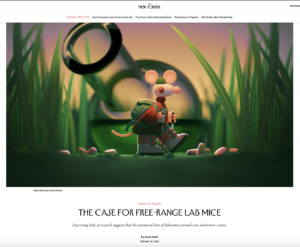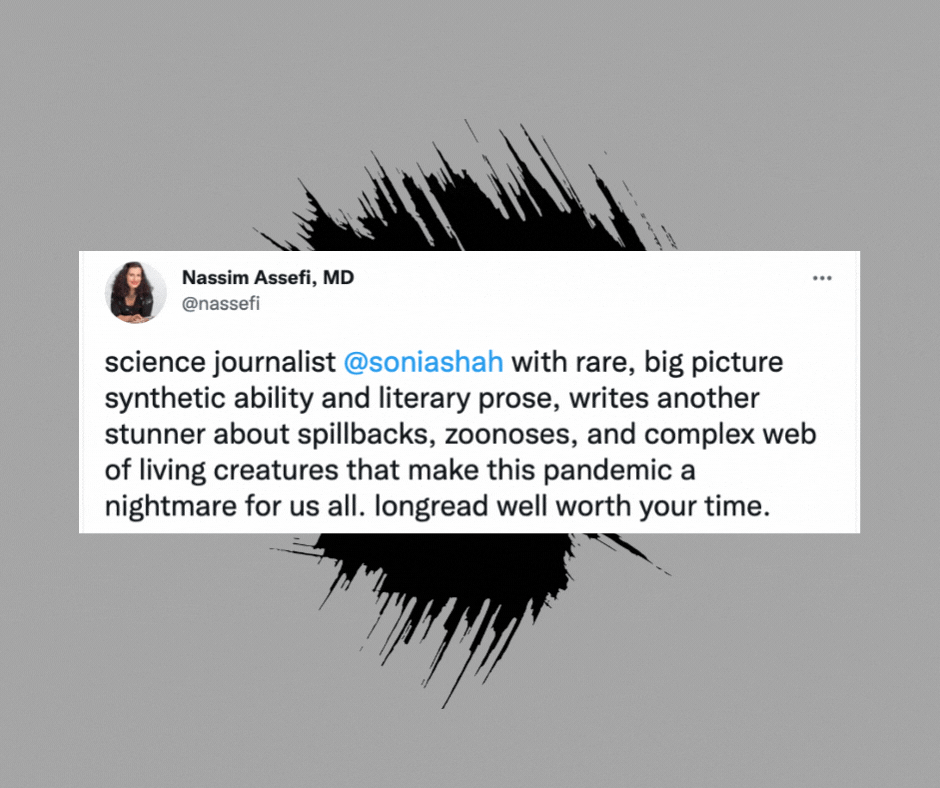My opinion piece on the FDA’s scrapping of the Declaration of Helsinki, and with it adequate protection for the human rights and safety of clinical trials subjects in the developing world, appeared in The Nation online a couple weeks ago. Check it out here.
Category: Articles (Page 5 of 7)
Late last month, a small notice in the Federal Register announced that after more than thirty years, the FDA will summarily excise the World Medical Association’s “Declaration of Helsinki,” the internationally recognized gold-standard for principles of ethical medical research, from its codes. It’s a shocking departure, and one that has hardly made a dent in the mainstream media. Here’s a guest blog I wrote about it for the national consumer rights group Prescription Access Litigation:
My new website, ResurgentMalaria.com, launched this week in advance of World Malaria Day on April 25. ResurgentMalaria.com explores the politics and history of malaria, one of humankind’s most fierce scourges. This is a disease we’ve known how to prevent and cure for over 100 years, but which still infects 500 million a year and kills over 1 million. Why that is is the subject of ResurgentMalaria.com. (Clue: it’s a bigger problem than just a failure of donations for bednets or grants for vaccine research.)
Check out a podcast about ResurgentMalaria.com from the UN Millennium Campaign here. And a blog post from Prescription Access Litigation (PAL) here.
Well, kind of. The OHRP shot out an email responding to Gawande this week. They say that the “program” was actually a research study,the results of which were published in the NEJM. That is, the peoplewho impemented the intervention didn’t actually know whether it wouldwork or not. Maybe the patient would start seizing on the table whileall the staff were huddled over the checklist, ticking boxes. Whoknows? With that kind of uncertainty, surely patients had a right to beinformed and consenting. And yet, the researchers had gotten no ethicscommittee review (IRB) or their subject’s informed consent.
But that wasn’t quite it, either. The “study” had no control group,because nobody wanted to NOT use the checklists. In other words, theerstwhile researchers felt they knew that it WOULD work. In which case,they were simply trying to improve patient care with a provenintervention and no IRB or informed consent was required.
So was it really a “study” or was it actually a “program”? Did they know it would work or didn’t they? How confused were they?
Well, in the actual doing of the thing, the clinicians conductedthemselves as if it were a program of improved care, but then when theywrote up their results in the NEJM, they cast their work as anexperimental ‘study.’
That’s not right, either: you can’t have it both ways. Someonecomplained to the OHRP, which opened some kind of investigation, whichthen led to Gawande’s complaint, and a flood of angry letters to theOHRP. Phew!
All of which is to say: there’s a shifting line between what we say weknow and what we say we need more research on. When there’s somethingwe want to do, when there’s political will and money to do it, wedispense with “research” quickly and move on to implementation. Inother areas–say, the administration of expensive drugs to poorpeople–there are endless calls for studies and experiments to provethe same thing over and over again, putting subjects at some risk everytime, because intransigent authorities (drug companies, healthministries) find it politically more expedient to say “we need moreresearch” instead of “sorry, no” (or “absolutely not, who cares aboutpoor people who don’t buy lots of stuff.”)
Fyi, these were the checklisted items, as reported in the NEJM, used inthe ICU on patients with catheters: hand washing, using full-barrierprecautions during the insertion of central venous catheters, cleaning the skin with chlorhexidine, avoiding the femoral site if possible, andremoving unnecessary catheters. The implementation of these procedurescoincided with a precipitous drop in the number of catheter-relatedinfections, but without the control group, no cause and effect can bedetermined, at least not by this study.
Today I randomly came across a long thoughtful pieceabout an essay I wrote over a decade ago…about the issues thatoccupied me for the first five years of my writing life–biculturalism,feminism, and sexuality. Who knew those old essays were still makingthe rounds?
Canada.cominterviewed the curator of a new exhibit on energy and oil, who verykindly mentioned my book CRUDE as one of 2 interesting books on thehistory of oil….the other being Yergin’s The Prize! Good company.Thanks for that.
Inhaled insulin: Here’s a great illustration of how disconnected the drug industry has become from public health….or even individual peoples’ health. When I went to a industry conference a few years back, Pfizer execs were gloating over their great new experimental product, a form of inhaled insulin. The drug was still in clinical trials–meaning they couldn’t have known whether it was truly safe and effective or whether it was any better than injected insulin–but they were certain that it would be a blockbuster. Because, of course, whether the drug was effective or any better than what we already have was irrelevant. Inhaled insulin is a great idea, in principle, and the obvious plan was to harangue patients with marketing so they’d switch to it on that basis alone.
Well, Pfizer’s drug, Exubera, was a bust. They “only” sold $12 million worth of it, and so now they are going to stop selling it! First it was the best thing since sliced bread, but now…since they aren’t making the billions they foresaw, they’re dumping it. So much for those users who did switch and actually liked it. They’re screwed.
Basically, the drug was a bust because it was no better than injected insulin and on top of that, it messed up patients’ lungs. A total disaster.
Now, a new company called Mannkind, backed by a billionaire investor, is launching a new inhaled insulin called Technosphere Insulin, similarly gloating–while the drug is still in clinical trials–that they will make billions on the thing. The New York Times business section featured their glossy PR in an article this morning, replete with a large pic of the billionaire investor looking smug in his grand digs. He might as well have had dollar signs tattooed on his eyeballs.
Buried near the end of the story we learn that–already!–more patients taking the inhaled insulin have dropped out of clinical trials than patients taking the old standby, injected insulin! “For reasons that are not yet clear”! Well, there can’t be any reason, in my mind, that doesn’t bode poorly for the inhaled insulin. They didn’t like it, they had adverse effects, or whatever.
And, the chief medical officer has accused the company of hiding information about the drug from the FDA! The company, in response, fired him. But we’ll never learn about the dirt he found because his wrongful termination suit has been settled out of court!
This thing seriously stinks. And it is all the more remarkable for the fact that all of this dirty laundry about the drug is tucked into what is overall a glowing business story.
Check it out: http://www.nytimes.com/2007/11/16/business/16mannkind.html?_r=1&oref=slogin
Will the Nigerian charges against Pfizer change how drug companies conduct clinical trials in developing countries? I don’t think so. The Nigerian authorities seem to be more interested in sensationalizing the charges and catering to their own disgruntled populace. (And can we really expect the Nigerian government and an American company to come clean about what happened during that mengingitis epidemic in 1996? Evidence suggests that the Nigerian authorities were complicit in some way, just as they’ve been complicit for decades in Western oil companies’ exploitation of their citizenry in the Niger delta.)
What’s really needed is greater transparency, but the Nigerian authorities are not asking for that. They’re asking for payback. The bad PR that Pfizer will inevitably get may very well make drug companies more secretive about their activities in poor countries–which will make clinical trials more dangerous for trial subjects everywhere.
Nigerian authorities have threatened to send Interpol to capture Pfizer staffers, after the nine Pfizer employees brought up on criminal charges in Nigeria failed to show up in court on Wednesday, after being served not just one but two summons.
“If they fail to appear in court” on November 6, the judge said, “we will have no option but to seek the help of Interpol in arresting them and bringing them to court.”
One suspects this is a ruse to appease a restive public–protests against Pfizer were in the works–while pumping up pressure to extract big dollars in a settlement. Out-of court talks to settle the case started in September, and are scheduled to resume on November 17…after the Pfizer folks stand trial.
The federal lawsuit against Pfizer was also adjourned, to October 22; and a final civil lawsuit was adjourned to December 5.
Stay tuned for more…
Newsweek’s short piece on malaria in Africa (September 24, 2007) is full of misinformation and mythology. For example, there has never been any continent-wide malaria control in Africa, as the lead sentence brazenly states; mosquitoes develop resistance to DDT by exposure to brand-name pesticides sold by Western chemical companies like BASF and others, not just by African farmers illegally using DDT on their fields; the main reason DDT wasn’t used in Africa for so long is because the EU and others told African farmers they wouldn’t buy their farm products if they did; and there’s evidence to suggest that malaria problem in Zambia has not gotten better, it has been worsening, and the mining companies’ whose work the article lauds have been the subject of riots.
None of these counter-points are speculative but near-consensus opinions in the malaria field. It is strange to see the mainstream press diverge so much from expert opinion: smells to me like politics eclipsing science.
Check it out: The Doomsday Spray: To fight malaria, African nations are turning to DDT.
Nigerian authorities slapped criminal charges on Pfizer this month, alleging that the company’s infamous 1996 botched antibiotic trial there was “rash and negligent,” and endangered lives.
Some of the subjects in the trial died, others suffered permanent disability, and the prosecutors say it’s Pfizer’s fault for providing a too-low dose of its comparator drug. (Listen to stories on NPR and ABC Australia, which feature a few quotes from me, for details.)
That’s a medical question on which the experts are not unanimous. Kids die from meningitis and are permanently disabled by it, too.
Less debatable is the fact that Pfizer violated international ethics standards and their subjects’ human rights. In a separate class-action suit against the company, the subjects said that they didn’t know they were in an experiment, and the company did not produce signed informed consent forms. The ethics committee “approval” the company produced later turned out to have been backdated.
This is the first time a state has filed criminal charges against a drug company, but I doubt it will be the last. With 80 percent of clinical trials failing to meet recruitment deadlines in the West, major drug companies are today conducting half or more of their trials outside the major markets, often in countries–like Nigeria–with poor human rights records and weak regulatory infrastructures. Pfizer’s Nigeria trial is unusually sensational and high profile, but its bending of the rules may be more the rule than the exception.












